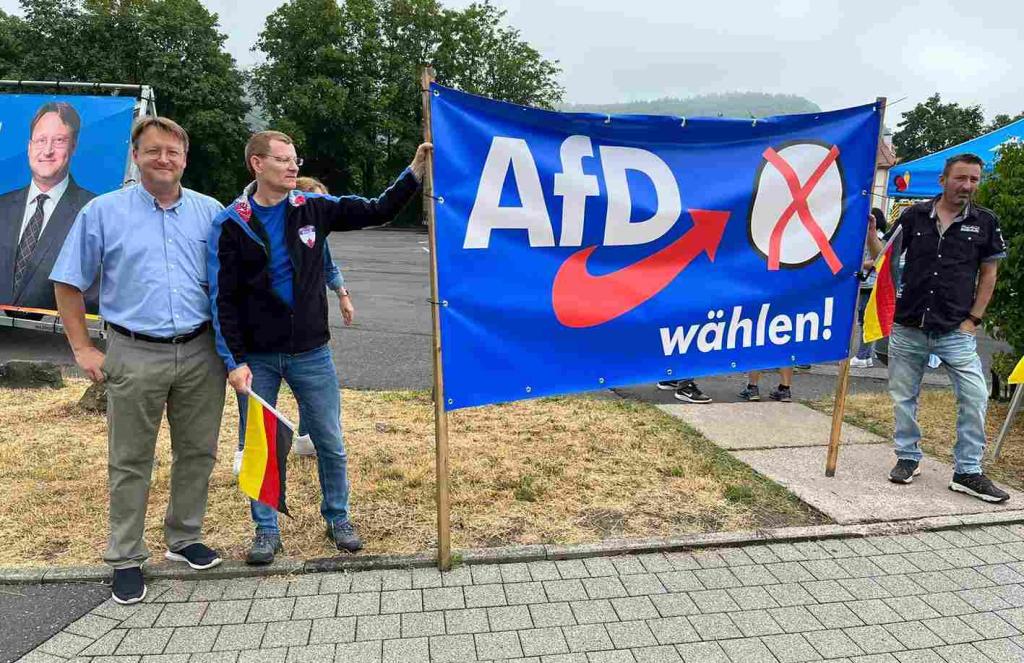Thessaloniki gets ready for its metro launch in November
The underground rapid transit lines have been under construction for almost two decades due to various project delays
 TheMayor.EU logo
TheMayor.EU logo 
AfD's Robert Sesselberg (on the left) will lead the district of Sonneberg (Thuringia), Source: AFD Gebietsverband Sonneberg
Alternative for Germany’s candidate came out on top in Sonneberg, and he will administrate without any need for coalition support
After the heady weekend that we witnessed in Russia, the German political landscape also offered an earthquake of sorts, albeit on a smaller scale, after the far-right AfD party won the election for a district administrator in Sonneberg.
This means that for the first time since the end of World War II and the demise of the Nazi party, a far-right politician will govern a territorial unit in Germany. Alternative for Germany (AfD) has formed part of governing coalitions before, but it has never controlled an administration unit on its own.
The man who will lead the Landkreis (the equivalent of a county or district) of Sonneberg, in the central state of Thuringia, is Robert Sesselman, a lawyer and regional lawmaker. He took 52.8% of the votes, despite appeals by the other parties to support his opponent – one Joergen Koepper from the conservative CDU.
With only around 57,000 people, Sonneberg is one of Germany's smaller districts, but the landmark victory makes it the first to be run by the Alternative for Germany (AfD) party. However, the result is historical and noteworthy due to its unprecedented nature, especially in a country which has been reeling for so long from the troublesome and traumatic legacy of the Nazi party rule in the 1930s and 1940s.
Far-right politics were taboo for the longest time in both parts of divided Germany during the Cold War, where de-Nazification became a policy for all successive governments. However, with the reunification and the resulting economic disparity between the West and the East of the country and the rise of populism and the liberation of all political narratives with the advent of social media, neo-Nazism and far-right parties have crept back on the scene, even in Germany.
This year marks a decade since the creation of AfD, which started as a Eurosceptic platform but then managed to gain popularity in the wake of the migrant crisis of 2015 and harness sentiments that laid dormant but unrepresented for a long time in the local political market.
The AfD is polling quite well in the former communist East German states of Thuringia, Brandenburg and Saxony, which will see regional elections next year where the party is hoping to score major breakthroughs.

The underground rapid transit lines have been under construction for almost two decades due to various project delays

Now you can get your wine in Talence by paying directly in Bitcoin

That’s because the state has to spend money on updating the railway infrastructure rather than subsidizing the cost of the popular pass

Rethinking renewable energy sources for the urban landscape

The examples, compiled by Beyond Fossil Fuels, can inform and inspire communities and entrepreneurs that still feel trepidation at the prospect of energy transition

Now you can get your wine in Talence by paying directly in Bitcoin

The 10th European Conference on Sustainable Cities and Towns (ESCT) sets the stage for stronger cooperation between the EU, national and local level to fast track Europe's transition to climate neutrality.

At least, that’s the promise made by the mayor of Paris, Anne Hidalgo

The underground rapid transit lines have been under construction for almost two decades due to various project delays

At least, that’s the promise made by the mayor of Paris, Anne Hidalgo

Hostal de Pinós is located in the geographical centre of the autonomous region

Despite its church-y name, the district has long been known as the hangout spot for the artsy crowds

Urban dwellers across the EU are having a say in making their surroundings friendlier to people and the environment.

Forests in the EU can help green the European construction industry and bolster a continent-wide push for architectural improvements.

Apply by 10 November and do your part for the transformation of European public spaces

An interview with the Mayor of a Polish city that seeks to reinvent itself

An interview with the newly elected ICLEI President and Mayor of Malmö

A conversation with the Mayor of Lisbon about the spirit and dimensions of innovation present in the Portuguese capital














